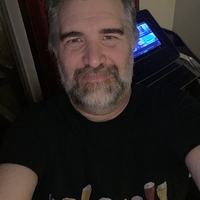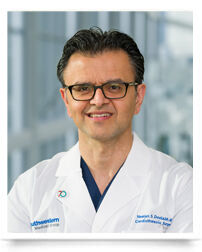Robotic Mitral Valve Repair Surgery: What Should Patients Know?
Written By: Adam Pick, Patient Advocate, Author & Website Founder
Medical Expert: Joanna Chikwe, MD, Chair of Cardiac Surgery at Cedars-Sinai Medical Center
Published: September 9, 2021
Patient interest in robotic mitral valve repair surgery continues to increase.
Now, more than ever, I’m getting patient questions about robot-assisted therapies and the surgeons that focus on this super-specialized approach to mitral valve repair. For example, I’m just getting off the phone with Elaine from Georgia. She asked me, “Adam, I have mitral regurgitation. I want a repair not a replacement. What do you think about surgery using the robot?”
I wanted to provide Elaine an expert response to this very important question. For that reason, I just interviewed Dr. Joanna Chikwe, Chair of Cardiac Surgery at Cedars-Sinai Medical Center in Los Angeles, California. So you know, Dr. Chikwe has dedicated her career to the treatment of valvular disease using minimally-invasive techniques. At HeartValveSurgery.com, Dr. Chikwe has successfully performed robotic mitral valve repair surgery on many patients in our community including Wendy Spector, Steve Rudack and Mark Kimball.
Key Learnings About Robotic Mitral Valve Repair
Here are key learnings from Dr. Chikwe’s interview about robotic mitral valve repair surgery:
- During her 20+ year career, Dr. Chikwe has performed thousands of cardiac procedures of which most involved some form of heart valve repair or heart valve replacement.
- Dr. Chikwe decided to specialize in mitral valve repair surgery given the transformative impact on the long-term health of her patients. As Dr. Chikwe states, “I love mitral valve surgery because it’s transformative. The procedure gives me the chance to restore a patient’s normal life expectancy. There’s almost nothing else we do in heart surgery that does that. Second, mitral valve repair surgery is incredibly creative. No one mitral valve is the same. Everybody needs an individualized repair.”
 Dr. Joanna Chikwe
Dr. Joanna Chikwe
- Patients with mitral regurgitation, a leaky heart valve, may need mitral valve repair surgery. Mitral regurgitation forces the heart to work “overtime” to pump blood through the body. Over time, mitral regurgitation can lead to an enlarged and weakened heart.
- Patient symptoms related to mitral regurgitation, which is one of the most common forms of heart valve disease, are feeling winded walking up stairs or in bed at night, heart palpitations due to atrial fibrillation, chest tightness, and fatigue. However, patients can also be asymptomatic (without symptoms).
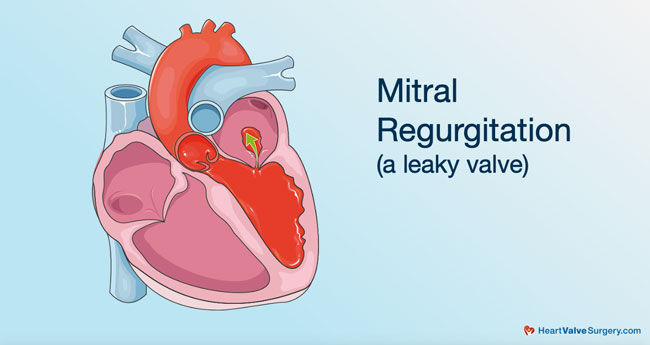
- Long-term cardiac damage from mitral regurgitation includes heart failure, stroke and atrial fibrillation.
- Dr. Chikwe’s recommended approach for mitral valve repair surgery is tailored to each patient. Dr. Chikwe states, “If you’re older, frail, and you have other illnesses… Maybe a minimally-invasive approach – such as the MitraClip – is going to be the safest option. For most of the patients I see, mitral valve repair surgery is the right option because that procedure can restore normal life expectancy.”
- The advantages of a mitral valve repair surgery include maintaining the natural architecture of the heart, durability (lasts longer) compared to a biological valve replacement, and patients do not need to be on blood thinners like they would if they get a mechanical valve replacement.
- While there are many approaches for accessing the heart (sternotomy, port access, mini-thoracotomy, transcatheter), the most important considerations for selecting an approach are safety and quality.
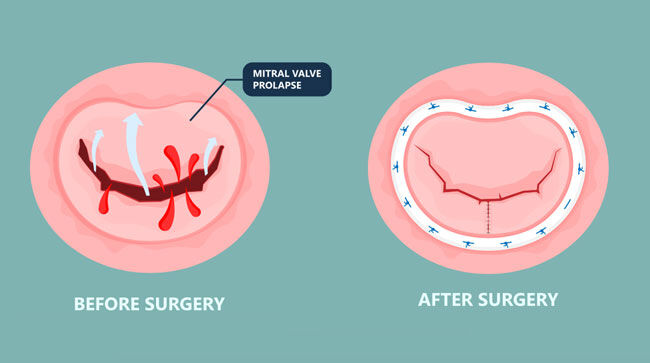
- Dr. Chikwe prefers the use of a robot for mitral valve repair surgery. The robot enables Dr. Chikwe to access the heart using a small incision through the ribs which helps patients leave the hospital in 3-4 days and get back to a normal life faster. The robot provides Dr. Chikwe a “game changing” three-dimensional view of the heart. The robot facilitates a super-precise surgery using tiny incisions. In addition, Dr. Chikwe’s entire team can see the procedure in real-time which is a great collaborative and educational tool.
- Specific to pain, the goal of Dr. Chikwe’s team is to provide patients a “pain-free” experience after robotic mitral valve repair surgery. Interestingly, Dr. Chikwe uses a local anesthetic to minimize and/or eliminate patient pain and discomfort after the procedure.
- While Dr. Chikwe has always focused on safety and the best possible outcomes for her mitral valve repair patients using minimally-invasive techniques, Dr. Chikwe began using the robot in 2019 when she joined Cedars-Sinai Medical Center. Dr. Chikwe states, “It wasn’t until I came to Cedars that I got the opportunity to use the robot with one of the most experienced teams in the country. That’s been completely transformational. Now, I perform about 95% of my mitral valve repairs robotically.”
- Robotic mitral valve surgery is a “team sport” at Cedars-Sinai. There are 8 members of the robotic mitral valve repair surgery team – 2 surgeons, 2 anesthesiology team members, 2 perfusionists, and 2 nurses.
- Dr. Chikwe believes a common myth about robotic mitral valve surgery is that it is NOT open-heart surgery. Dr. Chikwe states, “The number one myth about robotic mitral valve surgery is that it is not open-heart surgery. It is. We are going on a heart-lung machine. We are stopping your heart. We’re going to open it and repair your mitral valve. It’s really safe. It is open-heart surgery.”
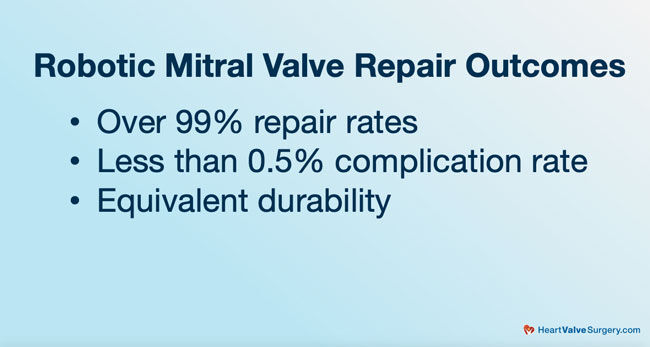
- Patient outcomes for robotic mitral valve repair surgery at Cedars-Sinai are excellent. In a recent study of 1,000 robotic mitral valve repair procedures, the Cedars-Sinai team achieved a 99% repair rate, less than a 0.5% complication rate, and durability is equivalent to any other series.
- Dr. Chikwe believes that the future of robotic surgery is bright. She believes that robot-assisted therapies will expand to mitral valve replacement, aortic valve replacement and other cardiac conditions in stand-alone settings including atrial fibrillation (Maze procedure) and coronary artery disease.
Many Thanks Dr. Chikwe & Cedars-Sinai!
Many thanks to Dr. Chikwe for taking the time to educate our patient community about robotic mitral valve repair surgery. We also want to thank the entire Cedars-Sinai team for taking such great care of patients from the HeartValveSurgery.com community!
Related Links:
- See Dr. Chikwe’s Interactive Surgeon Profile
- Mitral Valve Repair: Different Approaches for Different Patients with Dr. Chikwe
- Dr. Chikwe Answers Female Patient Questions About Heart Surgery
Keep on tickin!
Adam
Video Transcript:
Adam Pick: Hi, everybody, it’s Adam with heartvalvesurgery.com, and this is a very special surgeon question and answer question all about robotic mitral valve repair surgery. I’m thrilled to be joined by Dr. Joanna Chikwe, who’s the chair of cardiac surgery at Cedars Sinai Medical Center in Los Angeles, California. During her extraordinary career, Dr. Chikwe has performed thousands of cardiac procedures of which most involved some form of valve repair or valve replacement procedure. Dr. Chikwe, thanks for being with us today.
Dr. Joanna Chikwe: Adam, it’s great to be with you and the heartvalvesurgery community again.
Adam Pick: We’re going to talk all about mitral valve surgery, but first a question all about you. What is it about mitral valve surgery that is so fascinating and attractive to you?
Dr. Joanna Chikwe: I love mitral valve surgery firstly because it’s transformative. It gives you the chance to restore a patient’s normal life expectancy. There’s almost nothing else we do in heart surgery that does that, and secondly, it’s incredibly creative. No one mitral valve is the same. Everybody needs an individualized repair.
Adam Pick: I love how you are personalizing the care for every single patient who needs mitral valve surgery, but let’s back up and talk about the why someone might need that procedure. Can you help explain for all the patients in our community what is mitral valve regurgitation? What are its symptoms, causes, and risks?
Dr. Joanna Chikwe: Sure thing, Adam. Everybody has four valves in their heart, and the job of those valves is to make sure that the blood just goes in one direction, and mitral valve regurgitation is when the second last valve in the heart leaks, and that means every time your heart beats, half the blood is going forward, but half the blood is going backwards into the wrong direction, and your heart has to do twice the amount of work to get the same job done at the end of the day. Your heart can do an amazing job of adapting to that, and initially you’ll get – heart will get stronger, and you might not even notice a problem, so one of the commonest ways mitral valve regurgitation is picked up is a physician might listen to your chest with a stethoscope and hear a murmur.
As the disease advances and your heart stops being able to compensate so well, you might find yourself getting winded when you walk. People often complain of fatigue, and the strange thing is women often tend to complain of fatigue more than men. Men tended to complain of feeling winded or breathless. The really important thing with mitral valve regurgitation is we’re trying to prevent the long-term damage. The long-term damage is heart failure. It could be stroke, and it could be atrial fibrillation.
Adam Pick: Dr. Chikwe, I’ve got to ask. Is mitral regurgitation common, and is it often that it needs to be treated?
Dr. Joanna Chikwe: Mitral valve regurgitation is really common. It’s one of the most common forms of heart valve disease, and every year in the United States, about 20,000 people will undergo procedures to correct their mitral valve regurgitation.
Adam Pick: For those 20,000 patients who may need a procedure, what is your recommended approach for treatment?
Dr. Joanna Chikwe: My recommended approach is really tailored to the individual patient. If you’re much older, very frail, you have a lot of other illnesses, maybe a minimally invasive approach such as the MitraClip is going to be the safest option. For most of the patients I see, surgery is the right option because it’s the one way that we have to restore normal life expectancy by repairing your mitral valve.
Adam Pick: Can you talk about what are the advantages of a repair or reconstructive procedure for the mitral valve compared to a replacement?
Dr. Joanna Chikwe: A repair keeps the natural architecture of your heart. It lasts longer than any kind of animal valve that we could put in the place of your own valve, and as opposed to a mechanical valve, you don’t need to take a blood thinner. It’s really the best option that we have.
Adam Pick: Let’s talk about the different approaches that surgeons can use to access the mitral valve during repair. I’ve heard of sternotomies, mini-sternotomies, robot-assisted, and minimally invasive port access. What is your preferred approach to repairing a mitral valve?
Dr. Joanna Chikwe: The best approach for any patient having mitral valve repair is one that doesn’t compromise on safety or the quality of the mitral valve repair. That’s front and central. The approach that works best for most of the patients that come to see me is the robotic mitral valve repair. That allows us to do the surgery through a small incision, not much bigger than the short arm of a credit card, between the ribs, and that allows people to go home within about three or four days and get back to normal. People worry about pain, and I tell patients if you’re having a standard sternotomy approach, the pain will be not as bad as you’re worried about, and for patients that are having the incision through the side, our goal is pain free, and for most patients, we use an injection of local anesthetic that’s a little bit like an epidural to ensure that they’re pain free from day one of surgery.
Adam Pick: From your perspective, what are the top three advantages or reasons you use a robot-assisted approach?
Dr. Joanna Chikwe: The reasons that I love using robots are number one the incredible precision that this three-dimensional image of the heart gives you. It’s really difficult to explain that to a surgeon that hasn’t seen that. It’s game changing for mitral valve surgery. The second reason I like to use the robot is it completely facilitates this super precise surgery through tiny incisions, and the third reason I like to use it is because the whole team can see real-time what you’re doing, and that makes it a great educational tool not just for your team but for other surgeons.
Adam Pick: Dr. Chikwe, have you always used the robot in your practice, or has that changed over the years?
Dr. Joanna Chikwe: I’ve always been focused on performing the best-quality mitral valve repair, ideally minimally invasively, but it wasn’t until I came to Cedars that I got the opportunity to use the robot with one of the most experienced teams in the country, and that’s been completely transformational, so now I would perform about 95% of my mitral valve repairs robotically.
Adam Pick: Dr. Chikwe, I’m sure the patients out there are wondering how do you do a robotic assisted mitral valve repair surgery.
Dr. Joanna Chikwe: When you’re in the operating room, there’ll be eight people there with you, two anesthesia team members, two perfusionists – they run the heart-lung machine – two nurses, one is scrubbed and one is circulating, and two surgeons. For the robotic cases, we use two attending surgeons routinely. One of us is at the bedside doing the assistant function, and one of us is sitting at the robotic console performing the mitral valve repair.
Adam Pick: It’s great to hear how you and your team there at Cedars are really taking this idea of heart surgery as a team sport and implementing that to the benefit of your patients. I’ve got to ask you. Are there any myths about robotic mitral valve surgery that you might want to address for the patients?
Dr. Joanna Chikwe: The number one myth about robotic mitral valve surgery is that it isn’t open-heart surgery. It is. We are going on a heart-lung machine. We are stopping your heart. We’re going to open it and repair your mitral valve. It’s really safe. It is open-heart surgery.
Adam Pick: Dr. Chikwe, can you talk about the outcomes of your robot-assisted mitral valve repair procedures?
Dr. Joanna Chikwe: The team at Cedars-Sinai is incredibly experienced with robotic mitral valve repair. We’ve recently published our outcomes of over 1,000 robotic mitral valve repairs, and we’ve achieved repair rates that are over 99%. The rate of major complications is less than .5%, and the durability of the repairs is equivalent to those done in any other major series.
Adam Pick: Congratulations to you and the entire team there at Cedars for those incredible outcomes for your patients. Got to ask you a big question all about what comes next for robotics and heart valve surgery. Can you share with our patients any ideas about where this is going?
Dr. Joanna Chikwe: At Cedars, we’re super excited about expanding the robotic platform to other cardiac surgery, so not just mitral valve repair, but mitral valve replacement, aortic valve replacement, and coronary artery bypass. We already do atrial fibrillation surgery at the time of robotic mitral valve repair, and it seems obvious that that’s a great platform for doing standalone atrial fibrillation surgery robotically as well.
Adam Pick: Dr. Chikwe, it’s great to hear about all the success you’ve had using the robot and all the potential applications of that platform for additional valve disorders and cardiac disease. On behalf of our entire community, thanks so much for taking time away from your very busy practice there at Cedars-Sinai in Los Angeles to help educate us all about robotic mitral valve surgery. Thanks for being with us.
Dr. Joanna Chikwe: Thank you very much, Adam. It is always a pleasure.
Adam Pick: Take care, Dr. Chikwe.
Dr. Joanna Chikwe: Bye.

